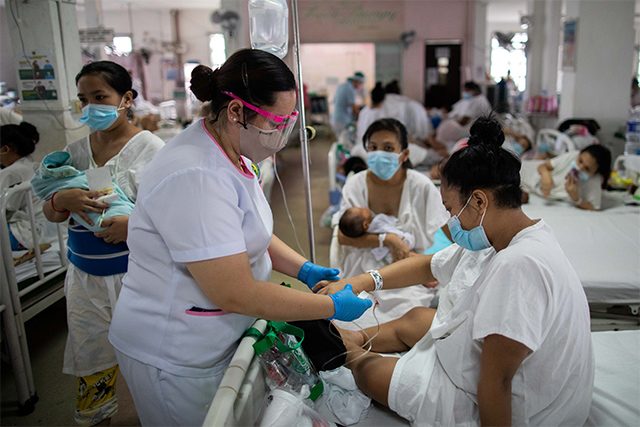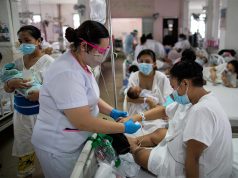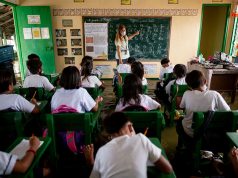
A “trade deal” with Japan during former president Gloria Macapagal-Arroyo‘s time was recalled on social media after the Department of Labor and Employment offered to exchange Filipino healthcare workers in exchange for vaccines from the United Kingdom and Germany.
READ: Philippines offers nurses in exchange for vaccines from Britain, Germany
Called the Japan-Philippines Economic Partnership Agreement (JPEPA), the deal’s goal was to increase or improve “trade and investment opportunities between the two economies.
It is the first bilateral free trade agreement for the Philippines after 50 years back then.
The trade-off
Alice Visperas, director of the labor ministry’s international affairs bureau, said the Philippines was open to let their health workers, mostly nurses, work in the two countries if they donate much-needed coronavirus vaccines.
These COVID-19 vaccines, in turn, will be used to inoculate overseas Filipino workers who will return abroad and thousands more Filipino repatriates.
“We are considering the request to lift the deployment cap, subject to agreement,” Visperas told Reuters.
The official noted DOLE Secretary Silvestre Bello III was the one who made this request for the sake of the OFWs.
“Secretary Bello’s request is for our OFWs, these are the OFWs that were repatriated, who are here in the country including those who will be deployed. It is important, especially those who are set to leave since many countries who are hiring migrant workers want workers that have been vaccinated,” Visperas said in another forum last Monday.
She added that the estimated number of displaced OFWs who will benefit from the vaccines are more than 600,000.
The national government limits the number of medical professionals working abroad at 5,000 per year. This deployment cap was previously imposed to ensure that there are enough health workers in the country during the coronavirus pandemic.
The Philippines currently has the highest number of infections in Asia.
As of February 24, the country recorded a total of 566,420 COVID-19 cases with 12,129 deaths and 523,321 recoveries.
Parallel with the Japan trade accord
Physician Gene Nisperos, a professor of the University of the Philippines, recalled the similar agreement with Japan in the past.
“Ginawa na yan dati, sa JPEPA (trade deal with Japan): isinama ang mga nurses sa saging. Iba iba man ang pangulo, patuloy ang labor export policy. Di na nagbago. Binebenta ang mga Pilipino,” wrote Nisperos.
Grabe, parang mangga lang ang turing sa mga healthcare workers: pang-trade at export.
Ginawa na yan dati, sa JPEPA (trade deal with Japan): isinama ang mga nurses sa saging.
Iba iba man ang pangulo, patuloy ang labor export policy. Di na nagbago. Binebenta ang mga Pilipino. https://t.co/laYTSWAabB
— doc gene (@genenisperos) February 23, 2021
From 2004 to 2006, along with other prime commodities, Filipino nurses, seafarers and other workers were also deployed in the neighboring country.
In a policy review by the Senate in 2007, it was assessed that the wages offered to Filipino nurses were not as “attractive” as the markets in the United States and the UK.
“Whether Japan would be an attractive market for Filipino nurses and caregivers remains unclear given stringent Japanese requirements (e.g. language proficiency) and the existence of other more lucrative markets for nurses such as US and UK,” the paper read.
“In 2006, the average monthly salary for Japanese nurses is estimated at US$1,643 (Y193,924) which may not be high enough to entice Filipino nurses considering Japan’s high cost of living,” it added.
A study published in 2008, stated that working condition of foreign nurses in Japan is “exploitative.”
The study cited some Indonesian trainees reportedly suffered from physical abuse, were forced to work overtime without pay and even denied basic rights such as freedom of movement.
Then free trade accord also stated that Filipino nurses and caregivers under training will not be treated as equal to their Japanese counterparts.
“They will be required to work as trainees in designated institutions and given six months to learn the Japanese language. They will then be asked to take national certification tests before they can qualify as nurse or caregiver,” an ABS-CBN report read.
The outrage
Meanwhile, the latest proposal of DOLE sparked outrage from the medical community and social media users. They said that health workers are not “goods” or “commodities” for trade.
NURSES IN EXCHANGE FOR VACCINES?! THAT’S EXTORTION.
Labor Secretary Silvestre Bello III has asked the governments of Germany and the UK to provide the Philippines with 600,000 doses of COVID-19 vaccines in exchange for the deployment of more Filipino health care workers. pic.twitter.com/g2eJUeG5As
— Miss Maggie (@MiaMagdalena) February 23, 2021
Filipino Nurses United, an organization for nurses, expressed to Reuters their disgust over the proposed deal.
“We are disgusted on how nurses and healthcare workers are being treated by the government as commodities or export products,” said Jocelyn Andamo, FNU secretary general.
Gabriela Women’s Party, on the other hand, questioned the need for the “trade-off” for vaccines.
“We should not even have to negotiate this way in the bid to acquire COVID-19 vaccines. Bakit kailangang i-barter ang mas malaking nurse deployment para sa bakuna sa ating mga OFWs? Why should it be at the risk of exporting more nurses to countries with steep cases of the deadly viral infection?” said Rep. Arlene Brosas of Gabriela.









